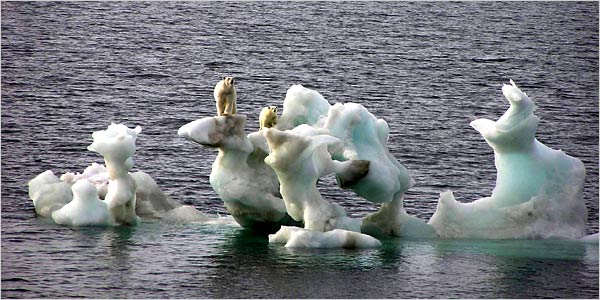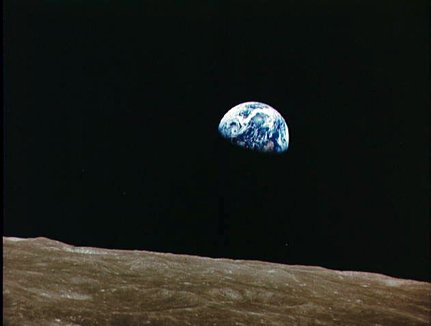Now What’s the Bush Administration Going to Do About It?
By Deanna Gorzynski, 2/7/07

February 2, 2007 45 nations
participated in the Intergovernmental Panel On Climate Change. The Panel was convened in the hope of motivating
the world to slow global warming and protect the planet. Even more importantly, it may have policy
power to punish violators. Glaringly
absent from the gathering was the world’s worst polluter, the United States. The booming nations
on the same path – China and
India
– also chose not to participate.
The Intergovernmental Panel
On Climate Change (IPCC) released a summary of the current science of climate
change. The summary, directed at policy makers, is based on six years of review
of scientific literature by experts around the world.
The report calls the evidence of global warming
“unequivocal”
The report finds rates of
both observed air and sea warming and sea level rise have accelerated over the
past century, and discusses other important changes being observed, including
more intense precipitation in some regions, prolonged droughts in others, and
intensification of hurricanes in some tropical regions.
The IPCC’s summary provided
the strongest statement to date on the extent and causes of global warming. The report expresses much greater confidence
than past assessments that most of the observed warming over the past
half-century is caused by human activities. The certainty of the scientists involved was
over 90%.
Real world observations have
been greatly bolstered by this work. Part
of the strength of this document is the conclusion of almost two decades”
observations and model projections. The
models regarding global temperature trends and the rise of CO2 levels reflect
observed changes quite well. In other
cases, such as observed sea level rise, the models underestimated the actual
change.
Observed impacts include,
but are not limited to:
-
Eleven of the
last twelve years rank among the twelve hottest years on record. -
The ocean has
warmed to at least 9,750 feet depth and is absorbing more than 80% of the heat
added to the climate system. -
Global sea level
rise is accelerating. -
Mountains and
glaciers and snow cover have declined in both northern and southern
hemispheres. -
Average Artic
sea ice has shrunk by 20% at its summertime minimum since satellite
observations began in 1978. -
More intense and
longer droughts have been observed over wider areas since the 1970’s,
particularly in the tropics and subtropics.
One of the many shocking
conclusions was the study of the longest period of time. Paleoclimactic information supports the
analysis that the warmth of the last 50 years is unusual in at least the
previous 1300 years. The last time the
polar regions were significantly warmer than present for an extended period was
about 125,000 years ago, a time when reductions in polar ice led to a 13-20
feet of sea level rise.
Future expectations include:
-
It is VERY
likely (a greater than 90% probability) that hot extremes, heat waves and heavy
precipitation will become more frequent. -
If global
average temperatures were to exceed 1.9-4.6 degrees Centigrade or 3.4-8.3 degrees Fahrenheit compared to
pre-industrial temperatures, the Greenland ice sheet would lose mass faster
than it gains, producing a noticeable rise of sea levels.
Former Vice President Al
Gore spoke to the conference by videophone,”We are at a tipping point. We must
act, and act swiftly”
John P. Holdren, an energy
and climate expert at Harvard
University said the
report,””powerfully underscores the need for a massive effort to slow the pace
of global climactic disruption before intolerable consequences become
inevitable.”

On the day the IPCC made
known its findings, U.S.
officials said the United
States had played a leading role in studying
and combating climate change, in part by an investment of an average of almost
$5 billion a year for the past six years in research and tax incentives for new
technologies.
Yet despite dire predictions
about global warming, “research into energy technologies by both government and
industry has not been rising, but rather falling.” (NY Times,10/30/06)
The Bush administration has
only allocated $3 billion per year for research to stop global warming and cut
down on greenhouse admissions. In 2007, the
Bush Regime will increase this amount to 4.2 billion, but that is “still a
small fraction of what most climate and energy experts say is needed.” (NY Times, 10/30/06)
The Bush administration has
also actively suppressed scientific findings proving global warming. Scientific reports have been ignored or
“edited” to completely change their content by administration officials. A prime example is what happened to Dr. James
Hansen, the top climate scientist at NASA, who spoke out publicly
against this blatant suppression and the dire threat of global warming, after
which the NASA public affairs staff was ordered to review his coming lectures,
papers, postings on the Goddard Web site and requests for interviews from
journalists. The phrase “to
understand and protect our home planet” was administratively taken out of
NASA’s mission statement last July. In
example after example, the Bush administration has appointed people to head
government agencies who use their ideological and political viewpoint to
suppress and obscure scientific facts.
The United States,
with approximately 5% of the world’s population, is known to contribute about a
quarter of greenhouse gas emissions, more than any other country.
In response to the Panels”
conclusions, Secretary of Energy Samuel Bodman rejected the suggestion of United States
enforcing unilateral limits on emissions, saying “We are a small contributor to
the overall, when you look at the rest of the world”.”
“February 2 will be
remembered as the date when uncertainty was removed as to whether humans had
anything to do with climate change on this planet”, said Achim Steiner,
executive director of the United Nations Environmental Program, which
administers the panel along with the World Meteorological Organization. He went on, “the evidence is on the table.”
The findings of the IPCC
point to the dire threat posed to the future of the planet and its people, and
the urgent need to drive out the regime that is suppressing scientific facts
and refusing to do anything to stop this disastrous path. Otherwise, the damage done could be
irreparable.

“It was not until we
saw the picture of the earth, from the moon, that we realized how small and how
helpless this planet is – something that
we must hold in our arms and care for.”
-Margaret Mead
